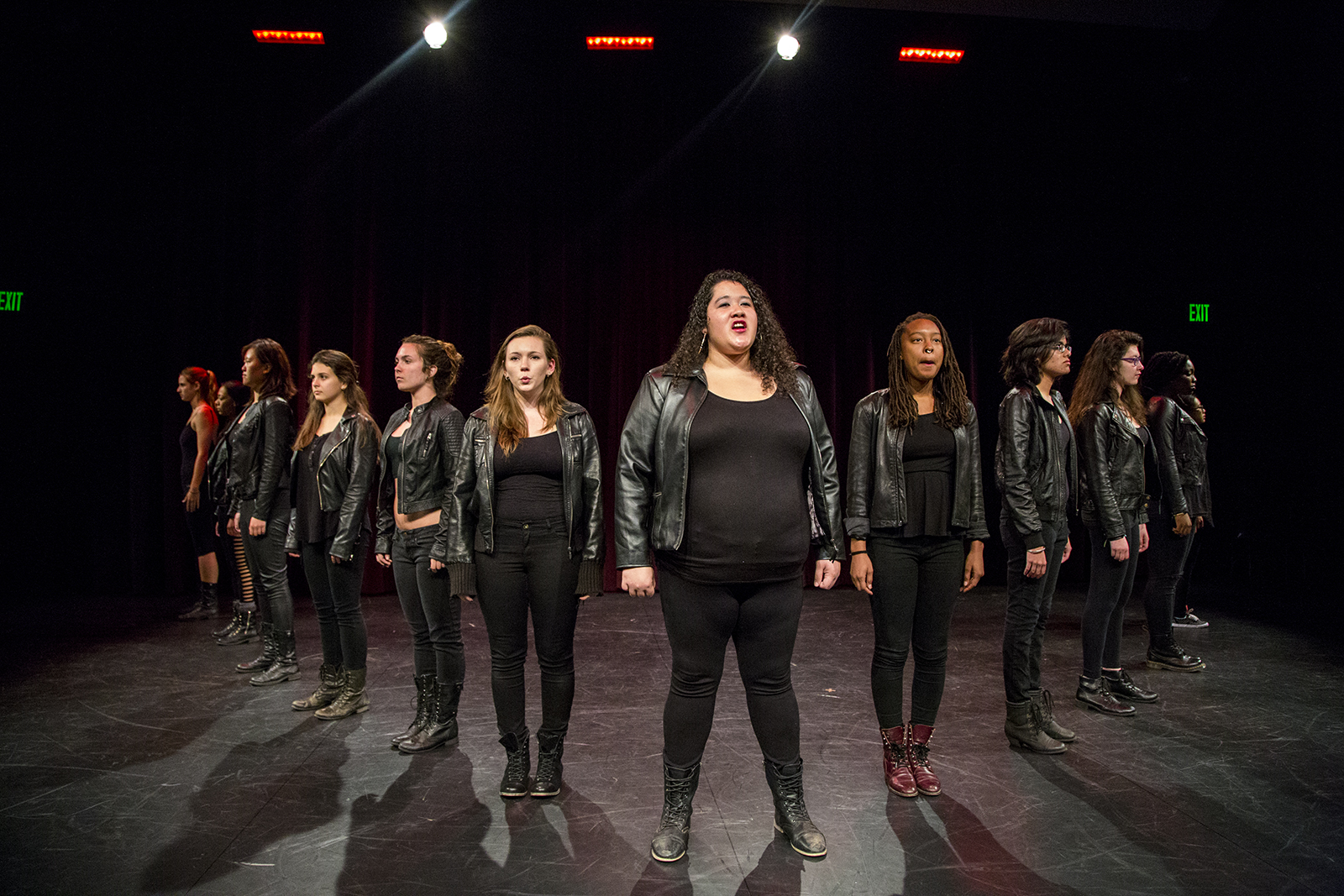The Quad: Rethinking our attitudes toward the word ‘virginity’

Virginity is contextual and not tied to heterosexual intercourse, as explored in three of the stories portrayed in V-Day Coalition’s Lips. (Daily Bruin file photo)
By Laney Chiu
Feb. 14, 2017 3:49 p.m.
Today is Feb. 14 and though I’m sure the number one V-word that’s on everyone’s mind is Valentine, I would like to redirect everyone’s attention to another word that needs to be revalued: virginity.
The other day, I was speaking to a female friend and was surprised to hear her view of virginity as something tangible that only consists of penetration of a vagina by a penis.
When virginity is narrowly defined for heterosexual sex, this limited definition negates the sexual experiences of gay individuals, and also excludes anal or oral sex, which are kinds of sex that are extremely important and meaningful for some.
Currently, Planned Parenthood defines virginity as “someone who has never had sex – but people define ‘sex’ differently.”
In regards to the origin of the term, “virginity” has been around since the medieval ages, according to Anke Bernau from the University of Manchester, who studies medieval culture.
According to fourth-year psychology student Tate Lyon-Johnson, the concept of virginity was established under a patriarchal mindset. Lyon-Johnson is a member of Sexperts, a UCLA organization within the Student Wellness Commission that works to advocate for a more positive way of viewing sex and to promote sexual health.
“I believe that the concept of virginity is just another one of those ways society attempts to control women’s sexuality,” he said.
Johnson’s point is elaborated on in a novel written by feminist writer Jessica Valenti called “The Purity Myth: How America’s Obsession with Virginity is Hurting Young Women.” In it, Valenti argues how this overwhelming humiliation and disgrace women receive for not being virgins harms the development of young girls who grow up believing their entire identity and worth is wrapped around their sexuality – or lack thereof.
Objectification of women is already a problem in our patriarchal society, as a paper published in The New York Sociologist argues. Typically, media images promote an “ideal” female body, and virginity is insinuated as an aspect of what makes a woman “ideal.” Stephanie Nicholl Berberick from the University at Buffalo found that these images from media mediate higher rates of low self-esteem, plastic surgery, eating disorders, depression, and even in some cases, sexual assault.
Not only is objectification of women wrong and conducive of negative psychological and physiological consequences for girls, but it makes no sense to tell women they are viewed primarily as sexual objects, and then shame them for engaging in sex.
“Lips“, a revamping of “The Vagina Monologues,” seeks among its many goals to empower women and correct these kinds of close-minded beliefs.
Second-year international development studies student Chelsea Hall, who is performing in “Lips,” explains that the original “The Vagina Monologues” was written over 20 years ago, and though it aimed to be empowering for women, succeeded in representing only those who were white, heterosexual, and cisgender. Now, Lips aims to represent a wider range of individuals and their different experiences.
[Related: Students to perform ‘Lips’ in fresh spin on ‘The Vagina Monologues’]
“Three of the monologues touch on virginity specifically, “ she said. “Virginity is discussed in the play, and … we do touch on how it isn’t actually a big deal at all and doesn’t just entail penis and vagina intercourse.”
In addition to controlling women’s sexuality, the idea of prizing virginity above all else contributes to the increased slut-shaming women experience in comparison to men. Women are often slut-shamed for having sex while men are praised.
“I have heard other men refer to virgin women as ‘untainted.’ Other men can’t seem to get it through their heads that women have sex,” Lyon-Johnson said.
This concept of losing one’s virginity also paints sex as a negative experience, as though one loses a part of themselves during sex.
Complications from the normalization of virginity can also arise if rape victims are forced to internalize the idea that they are no longer virgins despite never having given permission for sex.
With all of this in mind, Sexperts’ stance on virginity seeks to be more positive and open-minded about this subject.
“Sexperts prefers to use ‘sexual debut,’ a term coined by gender health advocate and YouTube star Laci Green. Sexual debut refers to the first time you had a sexual experience with someone that crossed a threshold of vulnerability,” said Lyon-Johnson.
“This inherently leaves the term broad and open to interpretation for the individual. In theory, one could have multiple sexual debuts. You could have a sexual debut with a different behavior, different gender, etc.”
Valentine’s Day provides us with an opportunity to reflect on arbitrary holidays and on the terms we have in our culture, and question their validity. As Sexperts seeks to reduce stigma surrounding sex and as Lips works to be more inclusive and empowering, so should we all the next time we decide to use the word virginity.

